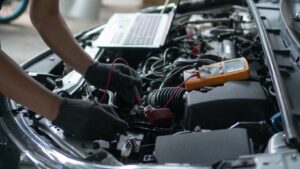How Long Does Car Maintenance Take
When considering car maintenance durations, it’s crucial to understand the varying timeframes associated with different types of services. From routine tasks to complex repairs, the time required for maintenance can range significantly. By grasping the factors that influence maintenance time, vehicle owners can better plan and manage their schedules efficiently.
Types of Maintenance Services
- Routine Maintenance: Regular services like oil changes, filter replacements, and tire rotations are among the quickest tasks, typically taking 30 minutes to an hour at most automotive service centers.
- Diagnostic Checks: Diagnostic procedures to identify issues such as engine light diagnostics or computer module scans usually take around 1-2 hours, depending on the complexity of the problem.

- Scheduled Inspections: Periodic maintenance checks, including brake inspections, fluid level inspections, and belt assessments, can vary from 1 to 2 hours, sometimes longer if any parts need replacement.
- Parts Availability: The availability of required parts influences maintenance time significantly. If specific components need to be ordered, it can prolong the repair process.
- Technician Expertise: The skill and expertise of the technician handling the maintenance play a vital role in determining how quickly and effectively the service can be completed.
- Vehicle Condition: The overall condition of the vehicle may impact maintenance time. Older vehicles or those with existing issues may require more time for thorough inspections and repairs.
- Service Complexity: The complexity of the service needed, such as engine repairs or transmission replacements, directly affects the duration of maintenance. More intricate tasks naturally take longer to complete.
Typical Timelines for Common Car Services
How Long Does Car Maintenance Take, understanding the time required for different services is essential for effective planning. From quick routine tasks like oil changes to more in-depth diagnostic checks, each service varies in duration. Factors influencing the time it takes for maintenance include parts availability, technician expertise, vehicle condition, and service complexity. Being informed about these factors can help vehicle owners schedule services efficiently to minimize inconvenience.
Oil changes are among the quickest car maintenance tasks, typically taking about 30 to 45 minutes to complete. This service involves draining the old oil, replacing the oil filter, and refilling the engine with fresh oil. The process is straightforward, making it a relatively fast procedure that can be done during a short stop at a service center or during routine maintenance appointments.
Tire services encompass tasks like tire rotations, wheel alignments, and tire replacements. On average, a tire rotation can take around 15 to 30 minutes per tire, depending on the vehicle type and the technician’s efficiency. Wheel alignment procedures may take slightly longer, ranging from 30 minutes to an hour. For tire replacements, the duration can vary based on the number of tires being changed and any additional services required, such as balancing and alignment.
Brake repairs involve inspecting and servicing various components of the braking system, such as brake pads, rotors, and calipers. The time required for brake repairs depends on the extent of the work needed. A simple brake pad replacement can take about 30 to 45 minutes per axle, while more complex repairs like rotor resurfacing or caliper replacements may extend the timeline to 1-2 hours. Proper brake maintenance is crucial for vehicle safety, so it’s essential to allocate sufficient time for thorough inspections and repairs.
How to Speed Up Your Car’s Maintenance
How Long Does Car Maintenance Take, proper scheduling and preparation are key. One can speed up the process by booking appointments during less busy times, such as weekdays or early mornings, to potentially reduce wait times.  Additionally, ensuring all necessary information about the vehicle and the required services is communicated beforehand can help streamline the maintenance process.
Additionally, ensuring all necessary information about the vehicle and the required services is communicated beforehand can help streamline the maintenance process.
Selecting the right service provider can significantly impact the speed of car maintenance. Opt for well-established centers with experienced technicians who can efficiently diagnose and address issues. Reading reviews and seeking recommendations can aid in choosing a reliable provider known for prompt and effective service delivery.Understanding car maintenance timeframes is essential for efficient scheduling and optimal vehicle performance. By prioritizing timely maintenance tasks and considering factors that influence maintenance duration, car owners can ensure their vehicles remain in top condition.

